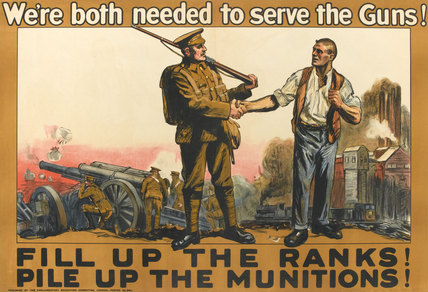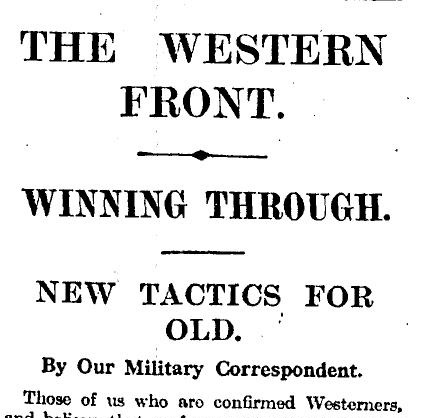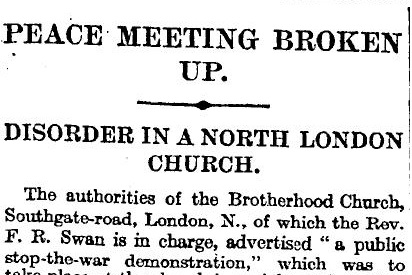Did the rebels intend to take power in Ireland by force of arms, or was the entire exercise a form of sacrifice in which a small group of idealists offered themselves up to inspire a larger number? “What happened on Easter Monday in Dublin is open to interpretation,” writes Tóibín. “As a military event, it makes almost no sense. Taking St Stephen’s Green, rather than Dublin Castle, suggests poor planning and lack of strategic thinking.” Indeed. Instead of capturing the city’s arsenal or barracks, the rebels occupied a post office, a bakery and a public park. This was revolution as performance art.
|
|||||
|
A few months ago I posted a graph of UK longevity and invited readers to guess when the NHS was created. This was difficult for the simple reason that the NHS had no effect on UK longevity. In similar vein I now produce a graph of First World War recruitment. Now I could ask the same sort of question: when was conscription introduced? However, I won’t, because lots of people will know it was in early 1916. But the same point applies: you can’t tell. This is extraordinary even to a state-o-sceptic like me. You would have thought it was a fairly simple matter to round up all the males between 18 and 40 and put them in uniform. But no. One of the reasons for this was that a large number of men were in starred (or reserved) occupations. These were industries such as agriculture and munitions manufacture that were deemed to be vital to the war effort. Indeed, in 1915 the government had to issue posters asking munitions workers to stay where they were and not join up. The truth is that voluntary means – posters, white feathers, belief in the cause – were extraordinarily successful in getting men to sign up. Family legend has it that my great-grandfather was in a starred profession (farmer) but still joined up – mainly due to being badgered to do so by the locals. There is another aspect to this. Conscript armies aren’t supposed to be very good. And yet, the almost entirely conscript British army of 1918 performed very well. It cannot be said too often and it is especially pertinent right now, given the state of the world’s economy now, and in particular given how America’s Presidential candidates are talking now: The Great Depression was both caused by and then horribly prolonged by bad governmental and political decisions. The Great Depression was not caused by unfettered capitalism. Throughout this unfolding disaster, capitalism was very fettered indeed, and it was these ever-tightening fetters which proved to be so disastrous:
That is the final paragraph of Lawrence W. Reed’s demolition of Cliché of Progressivism #33 (that it was all the fault of “Unfettered Capitalism”) for FEE (the Foundation for Economic Education). I was steered towards this piece because of its Quotulatiousness. That blog quotulates a few of the early paragraphs of Reed’s piece. I say: read the whole thing. Almost as important as how the Great Depression began and was prolonged is how it ended, just after World War 2, as Reed also explains very well. If you want a bit more detail about that recovery, and in particular of its politics, try reading the chapter on mid-twentieth century America in JP Floru’s book Heavens on Earth (SQotD-ed here), which is about eight such happy episodes around the world in recent times. The world now knows, in the words of Floru’s final chapter heading (also the sub-title of his book), “How To Create Mass Prosperity”. Or rather, the sensible parts of it do. The only uncertainly about the free-market, non-interventionist policies that Reed and Floru recommend is in whether such policies will be applied in the first place, and whether they will then be persisted with. See also this earlier posting here, which reports on, among other things, a ding-dong I had with Lord Skidelsky concerning this exact same point. On the 70th anniversary of Churchill’s Iron Curtain speech, and the 63rd anniversary of Stalin’s death, the 80th birthday of the Spitfire, I post Mr Bill Kristol’s long (c. 80 minutes) and informative interview with Garry Kasparov, the noted former World Chess Champion, focusing on the collapse of the Soviet Union, with some vignettes on his own life, starting off in Baku, the fifth city of the USSR. As Mr Kasparov likes to tell Americans, he grew up in the Deep South close to Georgia, but around 1,500 miles from Moscow. One should remember that Mr Kasparov makes Muhammed Ali at his prime seem rather diffident. Mr Kasparov is half-Jewish, half-Armenian, but culturally Russian. He talks about his early life, his Jewish father died when he was 7, he grew up believing in the Soviet system right into the mid-1980s, he thought that socialism’s ills were not due to ‘the rotten nature of socialism‘, but were a problem of implementation. He had been introduced, by his paternal uncle, to non-Soviet Jewish literature from the local Jewish intelligentsia so he got some insight into ‘the other side of the story‘, but it took time before he realised that the problem was the system. For the talented under socialism, there were very few options, you could not go into law (perhaps a good thing?), into business, into politics (as opposed to the Party) a whole range of careers that Westerners might regard as options were not available under the Soviet system, but sport, ballet and chess were options for ambitious parents eager for their children to do well (they hadn’t quite abolished that). He also points out that chess was never part of the Soviet education system, they had no interest improving education, but only in finding talent, ultimately for propaganda purposes. He was privileged to go abroad (and to Paris) at the age of 13 for a chess tournament, he had to be approved and recommended by a Party Committee even at that age, and he was the only person in his circle who had gone to a capitalist country (yes, I know). He read Solzhenitsyn in 1981, (when outside the USSR) and said his name was like Voldemort, everyone knew of him, but he was he who must not be named. He talks about how he managed to grope his way away from support for socialism and the Party, and discussions with his die-hard Communist grandfather, baffled by the jamming of Radio Liberty, and how the regime became less ‘vibrant‘, and the panic induced by the election of Ronald Reagan after the ‘malleable’ (my word) Jimmy Carter. Funny how looking back, it’s almost as if the Left in the West did everything that Moscow asked 😉 At one point in 1985, Steve Jobs went to Moscow to talk to the Soviet Academy of Sciences, a rather unproductive use of both’s time. He talks about the coming of Gorbachev, who was utterly indifferent to the anti-Armenian pogroms in Baku, Azerbaijan in what became the dying days of the USSR, and the SDI being what drove Gorbachev to negotiate a bad deal at Reykjavik. He says that it is vital for Russia to have a Nuremburg Tribunal on the crimes of communism. At 1 hour 9′ 9″ he talks about Soviet Nukes and the Ukraine’s nuclear arsenal, 2,000 warheads, bigger than France, China and UK combined, and the betrayal of the guarantees of Budapest in 1994. If you take a look at his Facebook page, there are some choice quotes from him, e.g. this from 1st March 2016:
And this over a cartoon of the Bern wearing a hat with the slogan “Make America Greece again”
And there’s no chess theory in there, not a single opinion on the King’s Indian Defence, Sämisch variation. The BBC have produced an article on the ‘crime wave’ that swept Britain during World War Two. As you might expect, the war provided plenty of cover for criminal elements, with looting of bombed-out houses, stealing rings from the dead and so on. But, as the article notes:
And there were price controls as well, again creating new crimes.
£11 for 2lbs of apples would be criminal now of course, but only because of the use of Imperial measurements, but £12.10p per kilo would be fine, rather than lead to one. It’s a good thing the War is over and freedom prevailed…. But back to the War, the government had its quotas for production
So that’s ‘The Common Good before the Individual Good‘, fighting fire with fire. At least it was only a gross input indicator, cultivate two acres, not produce X thousand lbs of potatoes, with fines for not having a good crop. And would you believe it, a government compensation scheme was abused by an unscrupulous person!
My image of life during the war is one of a life of dreary, unrelenting anxiety: Will we have enough to eat? Will we be killed by bombs? Will my family survive? When will it all end? Whilst the war had to be fought and won, I cannot help wondering if the brutal conditioning of the populace helped to pave the way for the subsequent strangulation of the freedoms preserved by victory. The article concludes:
Isn’t that what the Soviets called ‘speculation‘? And from that long lesson in human nature and economics, never in the field of human conflict, has so little, been learned, by so many. The laws of ancient Rome were engraved onto Twelve Tables that were displayed in the forum for all to see. Cicero lamented that in his time the old tradition of memorizing them all had fallen into disuse. The laws of ancient England were recorded on vellum. As are, it seems, the more voluminous laws of the modern United Kingdom. The Cabinet Office lamented that in our time this thousand year old tradition was about to fall into disuse, and offered to keep paying to continue a custom that those soulless modernizers in the House of Lords had wanted to jettison on grounds of cost. My correspondent ARC writes,
This is one situation where it it might be beneficial to increase rather than decrease the cost and inconvenience of government. Calves died to give us these vellum scrolls. We dishonour them with this new-fangled mechanical printing. Let us demand that the originator of each Bill personally inscribe his proposed law onto a vellum scroll in a traditional Insular Minuscule hand. And why stop there? Let us follow the earlier and even wiser example set by the assembly of one of the Greek colonies in Italy, Locris, where according to Demosthenes it was decreed
On 2nd February 1921, John Alan Quinton was born in Brockley, south London. He would have been 95 today, had he not died, he was killed in a ‘plane crash aged 30, in the following circumstances, as recorded in his George Cross citation.
With our recent discussion of genes and selfishness, here was a man, a whole, thinking being, with an infant son of his own, and having survived WW2 as a Navigator in Mosquitos in the RAF, who was, when the ultimate challenge presented itself, prepared to give up his own life for that of a stranger. His example is a reminder that an acting human being is capable of doing things for other than ‘selfish’ reasons. Flight-Lieutenant Quinton’s final act was the ultimate demonstration that a principle – that one should do what is right when in a position of responsibility – can triumph over base instincts, a counter-point to many lesser people who have failed to do what is right in difficult situations, even when not in mortal peril.
Charles à Court Repington was a former army officer who became The Times’s military correspondent. I have mentioned him before and so far I have been pretty impressed with his analyses. But in this article (here and here), in which he considers strategy and high-level tactics, he outdoes himself. Here are his main points: 1. The Western Front is the key theatre. It’s also the nearest. Britain’s main effort must be concentrated here. So, what happened? After the catastrophe at Gallipoli, the “Easterners”, as they were known – or “cranks” as I tend to think of them – were largely ignored. The main effort was indeed put on the Western Front and that is where the war was eventually won. Co-ordination. As it happens, at Chantilly in December 1915, the Allies had already agreed to co-ordinate their efforts. Unfortunately, the Germans took the initiative at Verdun, more or less completely taking the French out of the picture. Still, the Somme, the Brusilov offensive and an Italian offensive did take place at more or less the same time. Haig continued to look for breakthroughs until about August 1917. He did so despite just about everyone around him – including Robertson, his nominal superior – thinking he was wrong. He did so in the belief – partly fed by an intelligence chief who told him what he wanted to hear – that the German army was about to crack. Cavalry. Some claim that cavalry was useful in the Hundred Days Offensive of 1918. Personally, I am doubtful. It certainly wasn’t any use beforehand with the exception of 1914. Cavalry generals. If we look at the really useless Western-Front commanders (army commanders and above) we find Allenby, Gough and French – all cavalry. The successful ones were Plumer, Horne, Byng and (belatedly) Rawlinson, of whom only Byng had any background in cavalry. That artillery was the dominant arm is beyond question. In battle after battle, if the artillery was right, victory followed. If it wasn’t, it didn’t. That’s not to say there weren’t great changes in infantry tactics and equipment, just that these were a lot less important. It took until 1917 for the artillery to acquire the shells it needed. About the only thing he gets wrong is his 150,000 figure for German casualties at Loos. The real figure was about a fifth of that. Otherwise he is bang on the money. In 1916, the Reverend Swan of the Brotherhood Church in Hackney held (I kid you not) a “Stop the War” meeting. It did not go well.
Now, why would that be?
Oh yeah?
Those were the days.
The vicar abandoned the proceedings but the crowd did not.
When I first read this article, I assumed this meeting was the doing of some wooly-headed cleric. Not so. The Brotherhood Church’s other great claim to fame was that in 1907 it hosted the 5th Congress of the Russian Social Democratic Labour Party (General Secretary, one V. I. Lenin). And, in case you were wondering, no, they were not duped. You’d need a heart of stone not to laugh. The Cold War ended a quarter of a century ago. Some are forgetting about it, others are never even learning about it. Many others are deliberately forgetting about the Cold War, because it, and how it ended, made them look bad. But the Cold War needs to be remembered. What it was. What it meant. And why it was such a good thing that the good side won and that the bad side lost. Sights like this poster, I suggest, which I managed to photograph at Pimlico tube station yesterday before the train I was awaiting blocked it from my view, might help. It is advertising a German series now running on British TV, set during the final years of the Cold War: I have not been watching Deutschland 83. Comments from any who have would be most welcome. If such comments materialise, I would not be surprised to learn that it contains many little touches of moral equivalence, inaccuracy, and deft little claims to the effect that the winners of the Cold War won it by mistake and that the losers of the Cold War lost it on purpose. I don’t know, but fear the worst on that front. (A little googling led me to this piece, which, with its typically snearing Reagan reference, does not reassure me.) But meanwhile, the above poster struck me yesterday and strikes me still as a breath of fresh, clean, truthful air. I particularly like the colour contrast. I further like that Marx and Lenin get blamed for this colour contrast. I like that there is barbed wire on the bad side but none on the good side, grim and grey sky on the bad side and blue sky on the good side, privation and militarism on the bad side and an abundance of tasty food, romantic pleasure and technological inventiveness on the good side. Perhaps the makers of this poster – and if not them than at least some of those distributing it and displaying it in this country – thought that they were being ironic rather than truthful. Perhaps some of these people think that this poster does not so much present truth as mock the truthful opinions of people like me and my fellow Samizdatistas, for being “simplistic”. If so, to hell with such anti-anti-communist imbeciles. I prefer the truth about the Cold War and I rejoice that this poster proclaims that truth, especially to people who may not now be aware of it. At the beginning of the Great War people wrote and the The Times published a lot of poetry. The main themes were glory and sacrifice. By 1915 The Times was publishing a lot less poetry and what it did publish was a lot less upbeat. Even so, I was a bit taken aback when they published this: There is nothing about glory. There is a lot about death. There is a bit of empire bashing. And there’s a bit of: “You owe us.” Frankly, I was a bit surprised that the pro-war, pro-empire Times had anything to do with it. And, oh yeah, there’s the author: Not a lot of Indians wrote to The Times in 1915. Or, if they did, they didn’t get published. I thought I’d google the name just in case. Interesting. The writer, it turns out was a woman, a graduate, an Indian nationalist thick with the Indian nationalist bigwigs and, after independence, a state governor. My guess is that that last bit means she did a lot of bad. In 1915 regulations on drinking were introduced on a town by town basis up and down the country. These regulations included restricted opening hours and the banning – I kid you not – of buying a round. The ostensible reason was to get munitions workers to show up for work on time. One of the very first – if not the first – hostelry to fall foul of the new regulations was The Swan in New Lane. Annie Hives, the landlady and three customers were all charged and found guilty of various breaches of the regulations. She had committed the heinous crime of serving alcohol after 9.30pm – without demanding payment, I might add – and they, the heinous crime of drinking it. Mrs Hives was fined 35 guineas in total which by my reckoning was about half a year’s pay for a working man on a good wage. New Lane is now known as New Row and The Swan appears to have been renamed The White Swan. That’s good enough for me and it’s good enough for Michael Jennings. We’ll be revisiting the scene of the crime to toast the memory of the White Swan Four – as they weren’t known – at 9.31 (or thereabouts) on Monday. Please feel free to join us. |
|||||

All content on this website (including text, photographs, audio files, and any other original works), unless otherwise noted, is licensed under a Creative Commons License. |
|||||










